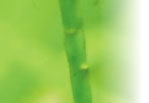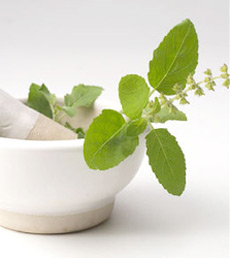



As the world wakes up to the freshness of nature and natural products, Herbs take on a leading role. Simple everyday foods and herbs have moved out of the kitchen to be an effective, inexpensive and safe part of health care. The time-tested science of Ayurveda uses the goodness of single herbs and different foods to keep your body at its healthiest best. Women Fitness presents a detailed Directory of herbs.
![]()
 Ocimum
tenuiflorum, also known as Holy Basil, tulsi, or tulasī, is an aromatic
plant in the family Lamiaceae which is native throughout the Eastern
World tropics and widespread as a cultivated plant and an escaped weed.
It is an erect, much branched subshrub, 30�60 cm tall with hairy stems
and simple, opposite, green leaves that are strongly scented.
Ocimum
tenuiflorum, also known as Holy Basil, tulsi, or tulasī, is an aromatic
plant in the family Lamiaceae which is native throughout the Eastern
World tropics and widespread as a cultivated plant and an escaped weed.
It is an erect, much branched subshrub, 30�60 cm tall with hairy stems
and simple, opposite, green leaves that are strongly scented.
Leaves have petioles, and are ovate, up to 5 cm long, usually slightly
toothed. The flowers are purplish in elongate racemes in close whorls.
The two main morphotypes cultivated in India and Nepal are green-leaved
(Sri or Lakshmi tulsi) and purple-leaved (Krishna tulsi). Tulsi is
cultivated for religious and medicinal purposes, and for its essential
oil. It is widely known across South Asia as a medicinal plant and an
herbal tea, commonly used in yurveda, and has an important role within
the Vaishnavite tradition of Hinduism, in which devotees perform worship
involving holy basil plants or leaves.
The variety of Ocimum tenuiflorum used in Thai cuisine is referred to as
Thai holy basil, it is not to be confused with Thai basil, which is a
variety of Ocimum basilicum.
The health benefits of Tulsi include the following:
Fever: The miraculous healing properties of Holy Basil come
mainly from its essential oils and Phytonutrients. Holy Basil is an
excellent anti biotic, germicidal, fungicidal and disinfectant and very
efficiently protects our body from nearly all sorts of bacterial, viral
and fungal infections. Fever is mainly caused due to infections from
protozoa (in case of malaria), bacteria (typhoid), viruses (flu) and
even allergic substances and fungus. Actually, fever is not an ailment
in itself. It is just a symptom which shows that our body is fighting
against infections. The tremendous disinfectant, germicidal and
fungicidal properties of Tulsi destroys all these pathogens discussed
above and heals fever. It is an old practice in India to have decoction
of Tulsi leaves and flowers in cases of fever.
Respiratory Disorders: Tulsi, apart from curing viral, bacterial
and fungal infections of the respiratory system, gives miraculous relief
in congestion due to presence of components like Camphene, Eugenol and
Cineole in its essential oils. It is very effective in curing nearly all
types of respiratory disorders including bronchitis (chronic and acute).
Asthma: Tulsi is very beneficial in Asthma as it relieves
congestion and facilitates breathing. The Phytonutrients and the
essential oils, with help from other minerals in it, helps cure the
causes of asthma also.
Lung Disorders: The compounds like vitamin-C, Camphene, Eugenol
and Cineole present in the essential oils of Tulsi do not only cure the
infections in lungs but also cure congestion of the lungs. They are also
found effective in healing damages caused to the lungs due to smoking,
tuberculosis, lung cancer etc. It also helps cure tuberculosis due to
its anti biotic properties.
Heart Diseases: The Holy Basil contains vitamin-C and other anti
oxidants such as Eugenol which protect the heart from harmful effects of
free radicals. In addition, Eugenol, a component in its essential oils,
is very beneficial in reducing cholesterol from blood.
Stress: Vitamin-C and other anti oxidants in Holy Basil, apart
from repairing damages done by the free radicals, also minimize the
stress induced by these oxidants. They soothe nerves, lower blood
pressure, reduce inflammation and thus reduce stress. One such component
is Camphene. Potassium also reduces blood pressure related stress by
replacing
sodium.
Oral Care: Tulsi is an excellent mouth freshener and oral
disinfectant and its freshness lasts very long in the outh. Holy Basil
destroys more than 99 percent of the germs and bacteria in the mouth and
this effect lasts long. It also cures ulcer in the mouth. It is also
known to help inhibit growth of oral cancer caused by chewing tobacco
etc.
Dental Care: Holy Basil destroys bacteria which are responsible
for dental cavities, plaque, tartar, bad breath etc. and protects teeth.
It also has astringent properties which make the gums hold the teeth
tighter thereby protecting them from falling. But, Tulsi also has
certain compounds mercury (having rich germicidal properties) which can
be harmful for the teeth if kept in direct contact for a long. Hence it
is advised to avoid chewing of these leaves (discussed in holy books and
Ayurveda that chewing leaves robs them of their holiness). But it has no
harm if you do not chew it or have its decoction.
Kidney Stones: Tulsi, being detoxifier and mild diuretic in
nature, help reduce uric acid level (main culprit as far as kidney
stones are concerned) concentration in the blood as well as helps
cleaning of the kidneys through rination. Acetic acid and certain
components in its essential oils also facilitate dissolution of the
stone. It also has pain-killer effects and help bear the pain from
kidney stones.
Skin Care: A daily bath with decoction of Holy Basil mixed with
your bathing water, or washing your face with it or simply applying the
paste of its leaves on infected area of the skin in case of skin
diseases or simply consuming Tulsi leaves, keeps your skin free from all
infections. You won�t believe this but rubbing basil leaves or oil
extracted from it on the body keeps mosquitoes and other insects away.
It cures skin disorders internally and externally, without any side
effects. This property mainly comes from its essential oils which are
highly anti biotic, disinfectant, anti bacterial and anti fungal in
nature. External application on the skin also removes extra oil from the
skin surface. Camphene in it also gives a soothing cooling effect.
Eye Care: Just wash your eyes daily with a few leaves of basil
soaked in water and you will be free from conjunctivitis, boils and many
other problems of eyes which are caused due to viral, bacterial or
fungal infection. It also soothes eyes and reduces stress. A regular
consumption can protect your eyes from all the damages done by the free
radicals, such as cataract, macular degeneration, glaucoma, vision
defects, opthalmia etc. due to the high anti oxidant properties of its
essential oils, vitamin-A, vitamin-C etc.
Headache: Headaches caused due to migraine, sinus, cough and
cold, high blood pressure etc. can be effectively controlled by the use
of a single Tulsi. Camphene, Eugenol, Cineol, Carvacrol and Methyl-Chavicol
have excellent analgesic, sedative, anti congestive and disinfectant
properties.
Anti Ageing: Vitamin-C, A, Phytonutrients and the essential oils
in it are excellent anti oxidants and protects the body from nearly all
the damages caused by the free radicals. In traditional Indian medicine
system called Ayurveda, it is considered as a tonic to retain youth and
avoid aging.
Immunity: Holy Basil is so good for boosting up the immune system
that cannot be explained in words. It protects from nearly all sorts of
infections from viruses, bacteria, fungi and protozoa. Recent studies
show that it is also helpful in inhibiting growth HIV and carcinogenic
cells.
Other Benefits: It can protect from radiation poisoning and also
heal up damages from it. It can be given after surgery to help heal
wounds quickly and also to protect them from infections. It acts as a
vaccine against pox if consumed regularly. It is anti carcinogenic and
found to be effective in healing nearly all types of cancer and tumors.
Being expectorant is one of the most priced properties of Holy Basil and
it is very efficient in curing cough and cold. It is beneficial in
reducing labor pain, destroying rabies germs, treating gastroenteritis,
cholera, whooping cough, measles, mumps, rheumatism, nausea, septic,
urinary and genital infections, destroying worms in stomach and its
dried leaves are mixed with food grains to use as an insect-repellant.
Apart from these, Holy Basil has numerous other medicinal values on
which an encyclopedia can be compiled.

![]()
![]()
![]()
